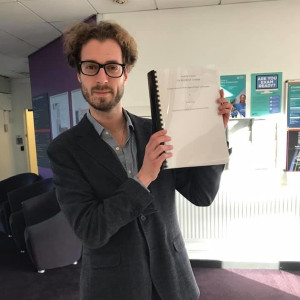Chapters
Some academics and students relish writing papers. Presenting their theses in written form gives them the chance to organise their ideas, arrange them into a logical flow and hone their language such that the narrative is crisp, engaging and easy to follow.
Others are flat terrified of committing their ideas to paper.
It's not that they're afraid their ideas are worthless or their argument is ridiculous. It's more that their work risks rejection over the smallest flaw. The failure to format their paper according to guidelines, the (hopefully) inadvertent plagiarism and syntax errors hang over the writer like a cumulative dark cloud.
Fortunately, all of these stumbling blocks can be easily avoided if you have a formula for writing. A checklist of sorts, to make sure you cover all of the bases.
You're in luck! Today, your Superprof delivers that very list.

Before You Write
For some students, hearing the word 'essay' causes them to break down. They may suffer from an inexplicable loss of appetite, an inability to sleep or a sudden aversion to confronting their computer - a device that may rank as their second-most cherished possession. (Their first may be their phone or gaming console.)
It’s such a shame that essay writing can cause these types of reaction.

Drafting an academic paper is a matter of getting in order what you want to say and then finding the words to do it with.
Granted, essay writing - writing in general represents a challenge that requires specific skills to overcome. The good news is that, once you master the ability to write with authority, you have it for the rest of your life.
Mastery of these skills allows you to reduce writing to a task to be thought over for a while and, once those considerations are done, effective phrases are constructed.
As someone who writes for a living, I can assure you that this is true.
Of course, once you get the technique down for writing essays, you'll see these assignments are infinitely easier to complete, and they turn out better the more essays you write.
With that in mind, let's start with the first of our essay-writing tips.
Writing essays at GCSE level requires a more thorough level of analysis, getting help from a GCSE English tutor can really help you develop your analysis skills.
ALWAYS Plan Them
Some essay writers are lucky; they get a prompt upon which to build their thesis. For instance, if you're history professor assigns you to write a paper on the Norman Conquest, that serves as your starting point. You may take your research and writing in any direction you choose - why they invaded, aspects of the battles and so on.
As long as you address the given topic (and all other elements of your paper are in order), you're golden.
On the other hand, some thesis writers don't get any guidance. For example, if you're an undergraduate student in a Physics programme, you have to hunt for gaps in the literature related to your field of study and find your thesis topic yourself.
Whether you're given a prompt or not, spending some time going through what the essay is going to talk about and what will go where is the best start you can make. This critical first step gives you a framework upon which to structure your ideas and build your narrative.
Your plan should briefly detail each section and what it will include. You may create a flowchart or simply list your ideas as bulleted points to be rearranged later, as you give your subject more thought. One particularly creative classmate of mine used Post-It notes, arranged on her mirror. She shuffled her ideas around until they lined up to her satisfaction.
Any way you want to organise your ideas is viable if it works for you.
Having a detailed plan gives you the roadmap to present your ideas and find the appropriate place to provide some analysis of them. As you draft your plan, be sure to include any references you will cite so that they will line up with the parts of your text that they're supposed to.
Even as a professional writer, I see the importance of getting a good plan in place. This article was planned before I started writing it. It makes the work of writing so much easier if I know what I want to say and when it should be said.
My plan helps me at the end of the essay (or article) as much as in the beginning. For instance, as I review what I've written, sometimes I wonder what I was thinking when I wrote it! Having a plan reminds me of where my thoughts were taking me at that time.
And, when the writing is done, I read over it and consider whether I’ve got everything in there that I should have… and if all my ideas fit together well. That's where a plan really comes in handy.
Browse the available private English tutors near me on Superprof.
Follow a Logical Flow
When writing fiction, it sometimes serves the story well to rearrange some of the elements. You may have read such books before or, if you're a fan of film, seen it in the form of flashbacks. Sometimes, a movie starts with the ending scene and then rewinds and takes you through the whole story.
Building a narrative that way does not serve well in academic writing. You cannot lay out your premise, flow into the exceptions you've found, draw your conclusions and then narrate your findings in full.
Think of the academic writing process like peeling an onion.
You must go, layer by layer, to expose the core (idea). Even if you cut your onion in half to expose the potential of a core, you must still go through all of the layers to get to it. There are no shortcuts allowed.
Generally, a good essay flow would look something like this:
- state your premise
- why you chose to expound on it
- the main points
- explore each point in depth
- disclose your findings
- talk about exceptions or exclusions
- summarize your findings in the conclusion section
- cite your references
Let's say you're studying Physics and have chosen Hawking radiation as your topic. Your premise may be the existence of such radiation, how it fits into the larger topic of black holes or what impact such radiation could have on the cosmos.
You may have chosen that subject because you don't believe such radiation exists, you don't believe that matter and antimatter cancel each other out or you wanted to validate your academic hero's postulate.
As you outline your main points, remember that you will have to go into them in depth later on. It would be a good idea to choose points for which a large body of literature exists for you to reference and draw information from. If you don't cite credible references, your essay risks rejection.
You might wonder about discussing exceptions and exclusions after disclosing your findings. That's because the people who will review your work are more concerned with the information that contributed to your conclusions, not that take away from your conclusions. It is important to include contradictory information but not before you reveal what you've discovered in your research.
NOTE: You school may have writing guidelines for you to follow; such guidelines may include how your essay should be structured. What we've laid out is just a rule of thumb, sort of a default set of guidelines drawn from many schools.
Browse the available profiles to hire a GCSE English tutor here.

As You're Writing
Once you get your ideas in order, it's time to start on your first draft. When you finally start writing, remember to...
Stick to Your Plan
This is rather important. Every once in a while, you might be tempted into changing bits and pieces or scrapping entire ideas in favour of some novel thought. That's not necessarily a good idea.
Remember that your original plan was laid out rationally, not because you suddenly came upon previously unknown information. That’s not to say that your new nugget of information won’t work in your essay, only that you might not have enough information to build an entire section around it (and you may not have time to find additional information).
Stick to your plan and find a place in it to put that new idea. Perhaps it belongs in one of your other sections? Maybe it could be added to the exclusions/exceptions part?
Keep your basic layout the same. If you do insist on changing it, then you will have to remember to go back through what you’ve written and see if it still works in your new plan. That could cost you time and, ultimately, your grade.
Get to the Point
Every writer rambles, even those who write academic papers for a living.
That habit runs contrary to conventional wisdom: writing is best when the author economises on words. So, unless you’re a philosopher - someone who is expected to expound at length, all you have to show is a decent grasp on your topic and use the aptest words to write about it.
Besides avoiding excessive language, keep on topic and try not to go off on any tangents. If you’re subject to a word limit, you’ll find this advice particularly valuable. Getting marked down because you waffled on about something and exceeded your count really is not a good idea, so keep your prose on-point.
Go Easy on the Descriptives
Adjectives and adverbs help readers visualise what the writer describes. They are invaluable when imagination is vital to understanding the story. Fortunately for academic essay writers, they are not writing stories so there's not much need for visualisation.
A worrying trend in spoken English: the need to make statements exponential by compounding adjectives/adverbs. Nobody exemplifies the abuse of descriptives more than the current American president. For him, everything is big, beautiful, so this and even more of that. Unfortunately, the trend is catching on.
To make your writing more effective - what's called 'clean' writing, use as few descriptors as you can. Your audience doesn't need to know the tiny number of droplets on the glass Petri dish you analysed; they only need to know what you found when you studied them.
Whether writing about art, history, literature or science, limiting the use of descriptive words will make you sound like you know what you're talking about. Also, it won't seem like you're trying to meet your wordcount by filling your text with unnecessary words.
Find English tutors Sheffield on Superprof.
Use Your Thesaurus
Another key to effective writing is avoiding repetition. Using the same words over and over again indicates a possibly limited vocabulary and perhaps even a touch of laziness - does that writer really not know any other words? Can s/he not use a thesaurus?
Granted, if you're writing a scientific paper, you may be hard-pressed to find substitute words for the technical jargon those works demand. That doesn't mean that the parts of your text written in everyday language must also repeat keywords.
If you don't have a thesaurus, you may find one at your campus library. If your computer is connected, you can use your favourite online dictionary's thesaurus and, if it's not, your document writer application likely has one built-in. (Check under the 'tools' tab to find it.)
One way to ensure that you haven't used the same word too often is through this simple test: CTRL+F (CMD+F on a Mac). Once the pane opens, type in the word you suspect is oft-repeated. It will give you a count of how many times that word appears in your document and where they're at. You may change a few of them if that count seems too high or if some are too close together.
Mind that Punctuation
Woman, without her man, is nothing.
This sentence illustrates how vital punctuation is to understanding the written word. Above, it suggests that women are nothing without their men. But take a look at that same string of words, this time punctuated differently.
Woman: without her, man is nothing.
Now, it's the men who have no worth without women. Furthermore, whereas the first sentence implies a sense of ownership - her man - the second suggests that women in general are integral to male value. How could we better illustrate the importance of punctuation than through these two examples?
Punctuation gives meaning to our texts and helps present our ideas in easily digestible bites. Surely, you're familiar with run-on sentences; you may even have come across them a time or two. Don't they make the text harder to understand? They also make it more difficult to accord that writer with any credibility.
Using the right punctuation marks and putting them in the right place could make the difference between your paper being recognised for the academic revelation it is or being rejected as intelligible.
Find a reputable English teacher online.

When You've Finished Writing
Breathe a sigh and take a break: the easy part is over! Now comes the detail work...
Citations and References
A surprising part of your grade comes from referencing your work. Citing references is something that you will need to spend a lot of time on so it's best to include referencing when you make out your plan and even as you write your essay.
Some academic writers prefer to draft their references section first because, as they research their paper, it's relatively easy to list the title, author and other details of the work they plan to cite. Later, if they find a better reference to list, they can always delete the first one.
Many find this method of referencing more efficient than writing the entire paper from the notes taken during research and then going back to re-find their referenced texts for listing.
Others include footnotes at the bottom of each page that includes a citation which detail referencing information. If this sounds better than making a separate list, you can find the 'header and footer' option under 'insert' tab of your document writer application.
Beware, though, that at the end of your essay, you must have a bibliography section that gives details of the books and websites you used.
The reference section is an integral part of academic writing.
Often, schools will insist on a particular style of referencing, though the most popular one tends to be Harvard Referencing. If you've yet to write your first paper, it would be best to get to grips with it quickly so that you know what to expect. You will find that many university libraries have a guide on referencing; some even run workshops.
If you're uncertain of how to proceed, there is nothing wrong with using a Reference Generator. There are several available online; you only need to input the required information for it to create the reference/citation for you. Such references aren’t subject to copyright so they are perfectly acceptable to use.
The main point to take out of referencing is that you have to get it right. Some universities will downgrade your work for poor referencing or reject your paper altogether. At worst, failure to reference your paper accurately could lead to accusations of plagiarism.
Proofread
Once you finally get everything written up and formatted according to expectations, you should go over your work again.
Read over it with a critical eye, looking for any errors you might have missed. Common errors include using the wrong homophone - their/there/they're, eg., improper punctuation - including misusing apostrophe (book's for sale) and missing words.
Woe to the writer who turns in their work without looking it over at least once! It would be a good idea to ask someone else to read it over, too. A fresh set of eyes can catch mistakes that you might have missed.
What about spelling?
I am not a fan of spell-checkers or autocorrect - not just because they don't know what I want to write or the fact that they don't know every single word. I don't know every single word, either, but I would do myself a disservice if I didn't learn the words I want or need to use... and so would you.
Considering how important academic essays are, it wouldn't hurt to run it through the spell-checker but, if you can, avoid using autocorrect or you're liable to end up with a brake when you really wanted a break.
Find an English tutor on Superprof.
Look Professional
In academic and professional matters, it's important to make a good first impression. How? You need to make your essay look the part. The best way to do that is with a properly-sized, suitable font (comic sans is not acceptable!).
If you have guidelines to follow - for line spacing and paragraphs, for image and table inserts and so on, you should stick to them.
In the absence of guidelines, some students double-space their paper to make it seem longer. Tutors and teachers can see through that trick so beware that your essay might get rejected. If you’ve been assigned to write a certain number of pages, double-spacing seems like a solid idea. However, as more teachers become wise to this trick, they're assigning wordcount essays.
All in all, if you get the presentation right (and maybe have a nice front cover page too), your teacher will likely be more inclined to give your essay the serious consideration it deserves. Get it wrong and you might find they’re a bit more critical.
Writing your first essay is not easy, no matter if it's your first-ever or your first for that teacher. Many times, you may feel like bashing your head against a wall - please don't. Use these tips to stay on task and you’ll find things fall into place nicely.
You may also enjoy these articles:
- GCSE English language - analysing fiction text
- Reviewing the basics of non-fiction texts
- How to effectively compare English language texts
- Becoming a better writer by reviewing the writing topic of the GCSE English language subject
- The speaking and listening topic from the GCSE English language subject















